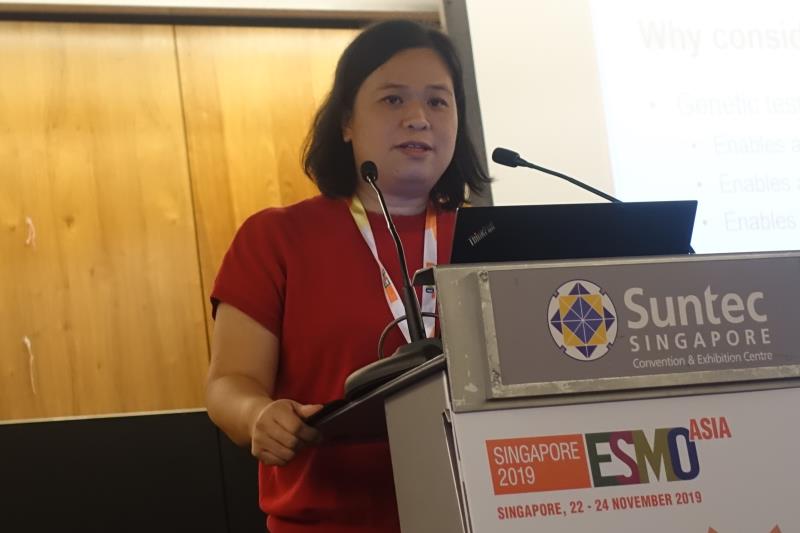 Dr Sook Yee Yoon, head of the Familial Research Project of Cancer Research Malaysia
Dr Sook Yee Yoon, head of the Familial Research Project of Cancer Research MalaysiaPushing genetic counselling into the mainstream through nongenetics clinicians, such as oncologists, appears to improve the uptake of genetic testing in ovarian cancer in Malaysia and marginally reduce distress and cancer worry among patients, according to data from the MAGIC* study presented at the ESMO Asia 2019 Congress.
“Identification of germline BRCA mutations in ovarian cancer patients allows clinicians to make treatment decisions and manage risks,” said principal investigator Dr Sook Yee Yoon who heads the Familial Research Project of Cancer Research Malaysia.
On top of that, genetic testing takes advantage of the increasing availability of drugs that depend on knowledge of germline abnormalities, namely poly ADP-ribose polymerase (PARP) inhibitors, Yoon added.
Ovarian cancer guidelines in most countries recommend BRCA testing for all women with invasive nonmucinous epithelial ovarian, fallopian tube and peritoneal cancer, irrespective of age and family history. However, Yoon pointed out that the uptake of testing is low regionally, owing to the lack of genetic counsellors, clinical geneticists and awareness among clinicians.
In MAGIC, Yoon and colleagues set up mainstreaming of genetic counselling/testing in 23 sites spread throughout the Malaysian states with 68 trained clinicians (32 oncologists, 36 gynae-oncologists). They recruited 800 patients with nonmucinous epithelial ovarian, peritoneal or fallopian tube cancer, 690 of which received genetic counselling while 110 were referred to genetic services.
With respect to BRCA prevalence for ovarian cancer, 13.9 percent had pathogenic variants; the majority (74.7 percent) were negative and 11.4 percent had variants of uncertain significance. Most patients in the mainstream arm were satisfied with their pretest counselling (mean Genetic Counselling Satisfaction Scale [GCSS] score, 23.9) and postresult disclosure (mean GCSS score, 24.6), and the large majority (86 percent) did not feel conflicted. [ESMO Asia 2019, abstract LBA11]
Mainstreaming saw an increase in the number of patients without issues in five out of six Psychosocial Aspect of Hereditary Cancer domains—from 46 percent at pretest counselling to 62 percent at result disclosure—with the main areas of concern being living with cancer, hereditary aspects and children. However, the percentage of those with high distress levels decreased from 22 percent at pretest to 16 percent at postresult, with most patients showing low distress levels at result disclosure.
“Distress and cancer worry are higher in patients seen by geneticists compared to those seen by oncologists, but decisional conflict is higher in those seen by the [latter],” Yoon pointed out. On the other hand, BRCA1/BRCA2 mutation carriers may be less likely to be distressed, have cancer worry or experience decisional conflict if seen by geneticists.
“There are many plausible reasons to explain these observations, most likely due to whether patients are seen by the doctor responsible for their care,” she continued.
In general, 76 percent of those who were approached through the mainstreaming arm would undergo testing, according to Yoon. In terms of coverage, “it’s about 54 percent of overall cancer patients who had actually taken up testing, which is actually remarkable compared to [the 5 percent uptake] when we did not have the study.”
Yoon explained that taking the traditional route of referral to a geneticist limits the access for patients who require counselling and testing, despite promoting better support and decision making, mainly because of logistics, with geneticists being only available in the capital.
“So what we really need to do in the future is to ensure that we are able to provide adequate training and support to nongenetics clinicians like the oncologists and the gynaecologists” to facilitate wider access to genetic testing and potentially improve outcomes, she said.
Acting as a discussant for a series of studies including MAGIC, Dr Mansoor Raza Mirza, who directs the Nordic Society of Gynaecological Oncology, agreed that continuous education of gynaecologists, oncologists, healthcare professionals, patients and other stakeholders are necessary if genetic testing is to be integrated into routine cancer care.
However, Mirza raised the therapeutic implications of BRCA testing, asking: “Is a PARP inhibitor available in your country? And if it is, is it affordable?”
He also mentioned a few legal consequences, including the need for legislations to avoid discrimination against BRCA carriers, especially in the setting of employment, as well as the implications surrounding insurance coverage (both medical and overall) for patients tested positive for BRCA mutation.
*Mainstreaming genetic counselling for genetic testing of BRCA1/2 in ovarian cancer patients in Malaysia